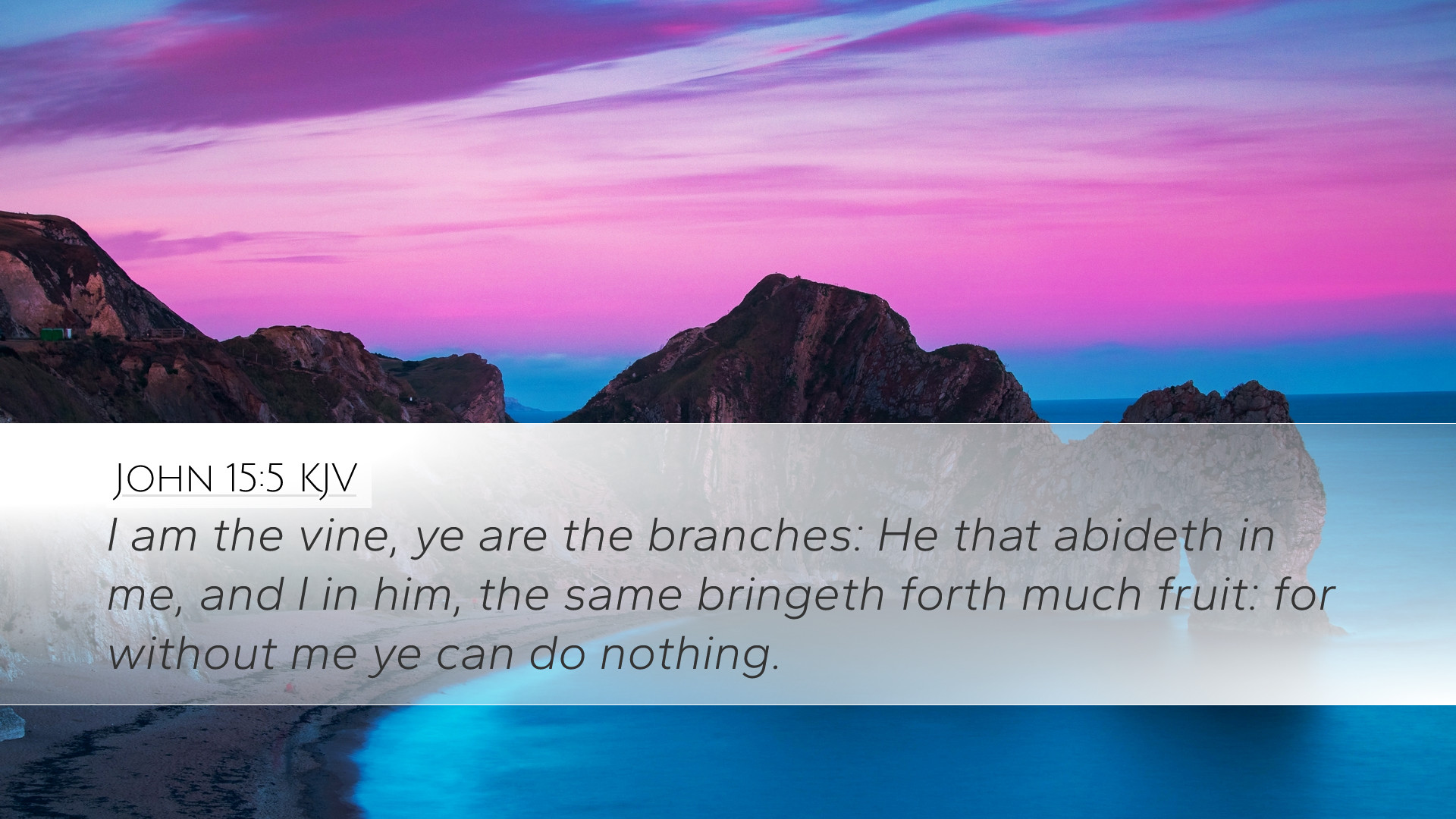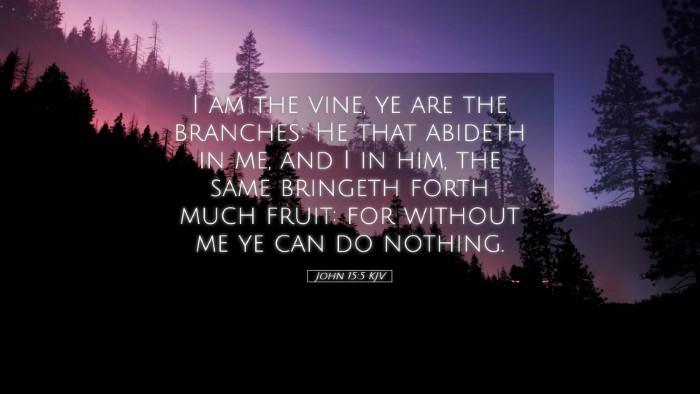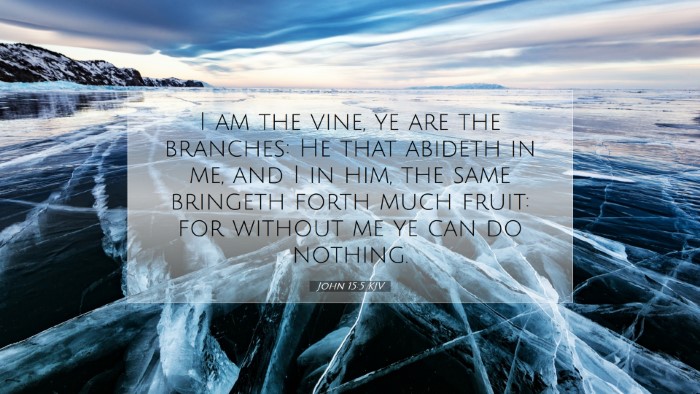Old Testament
Genesis Exodus Leviticus Numbers Deuteronomy Joshua Judges Ruth 1 Samuel 2 Samuel 1 Kings 2 Kings 1 Chronicles 2 Chronicles Ezra Nehemiah Esther Job Psalms Proverbs Ecclesiastes Song of Solomon Isaiah Jeremiah Lamentations Ezekiel Daniel Hosea Joel Amos Obadiah Jonah Micah Nahum Habakkuk Zephaniah Haggai Zechariah MalachiJohn 15:5
John 15:5 KJV
I am the vine, ye are the branches: He that abideth in me, and I in him, the same bringeth forth much fruit: for without me ye can do nothing.
John 15:5 Bible Commentary
Commentary on John 15:5
Verse: "I am the vine; ye are the branches: He that abideth in me, and I in him, the same bringeth forth much fruit: for without me ye can do nothing." (John 15:5)
Introduction
This pivotal verse encapsulates the profound relationship between Christ and believers. It serves as a reminder of our dependence on Him for spiritual vitality and effectiveness in ministry. Drawing insights from esteemed public domain commentaries, we explore the depth of this relationship and its implications for Christian living.
1. The Vine and the Branches Metaphor
This metaphor is fundamental to understanding the dynamic between Jesus and His followers. Matthew Henry comments on this imagery by stating that the vine represents Christ's divine life flowing to believers, while the branches symbolize the believers' identity and growth.
- Christ as the Source: According to Albert Barnes, the vine is recognized as the central source of nourishment. Just as a branch cannot flourish without the vine, Christians cannot thrive spiritually without Christ. This underscores the notion of reliance on Jesus for spiritual sustenance.
- Believers as Branches: Adam Clarke emphasizes that believers are called to be interconnected with Christ. Each branch, while unique, is dependent on the vine for life. This indicates that individuality in the body of Christ does not imply autonomy from Him.
2. Abiding in Christ
The act of 'abiding' is central to this verse. John emphasizes the necessity of maintaining a continual relationship with Jesus. Matthew Henry articulates this by suggesting that to abide in Christ means to rest in Him, trust Him, and derive strength and life from Him.
- Bearing Fruit: Jesus states that those who abide in Him will bear much fruit. This aligns with Albert Barnes' perspective that "fruit" refers to the manifestations of a believer’s faith, including good works, spiritual growth, and character transformation.
- The Nature of Fruitfulness: Adam Clarke notes that fruitfulness is not merely quantitative but qualitative, reflecting the nature and character of Christ in the believers. This fruit is a testament to the life of Christ in us.
3. The Consequences of Separation
Jesus concludes the verse with a stark warning about the consequences of disconnection from Him: "for without me ye can do nothing." This assertion carries weight, as highlighted by various commentators.
- Spiritual Ineffectiveness: Matthew Henry elaborates on this, stressing that without the divine connection, all human efforts are futile. We may achieve temporal success, but lack eternal significance.
- Dependence on Grace: Albert Barnes reinforces this idea by pointing out that it is through Christ that believers are enabled to perform good works. Any attempt to serve God without reliance on His grace will lead to spiritual barrenness.
4. Practical Applications for Believers
This verse not only serves as doctrinal instruction but also provides practical applications for contemporary believers. Each lesson drawn can influence personal devotion, corporate worship, and effective ministry.
- Cultivating Relationship: Believers are encouraged to engage in spiritual disciplines that foster a deeper relationship with Christ, as emphasized by Matthew Henry. Prayer, study of the Word, and meditation are essential for abiding in Him.
- Community and Fellowship: Adam Clarke points out the importance of Christian fellowship as avenues for mutual support in maintaining one's connection to the vine. The church is called to be a community where believers help one another abide in Christ.
- Evangelistic Fruitfulness: Albert Barnes encourages believers to view their fruitfulness as a witness to the world, demonstrating the life-changing power of Jesus. This motivates evangelism and outreach as expressions of faith.
5. Conclusion
John 15:5 serves as a vital reminder of our identity as branches connected to Christ, the true vine. The dependence on Him is not only an individual necessity but also a communal responsibility. The insights from Matthew Henry, Albert Barnes, and Adam Clarke provide a rich tapestry for understanding this divine relationship, emphasizing that in Christ alone do we find our purpose, strength, and ability to bear much fruit for His glory.


